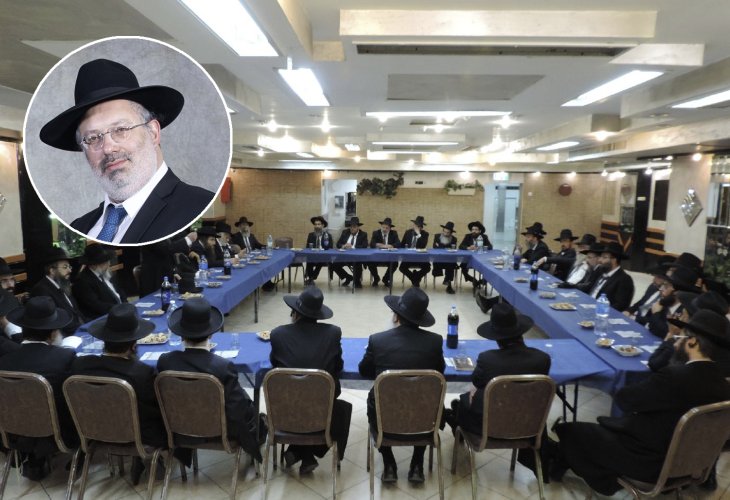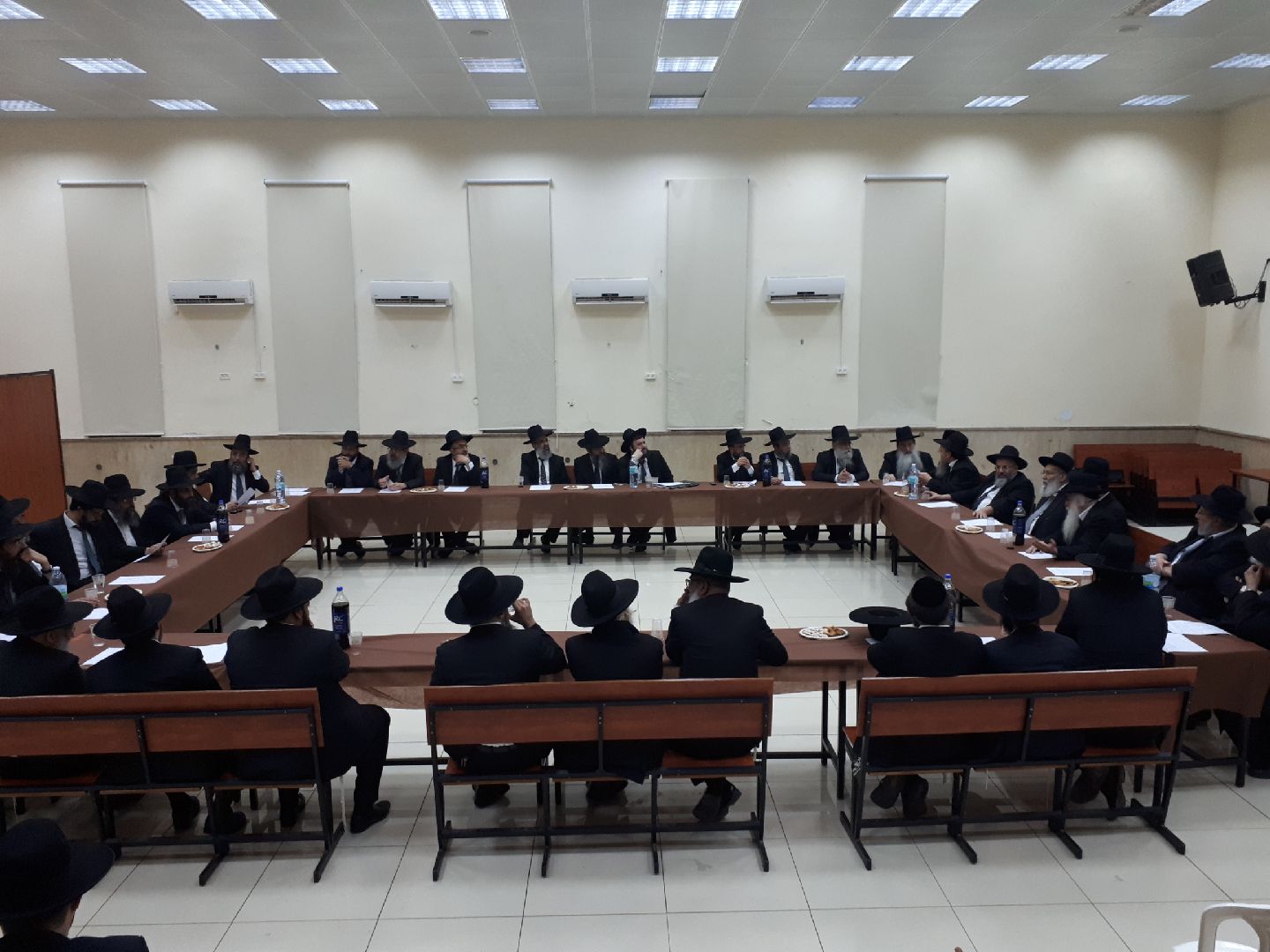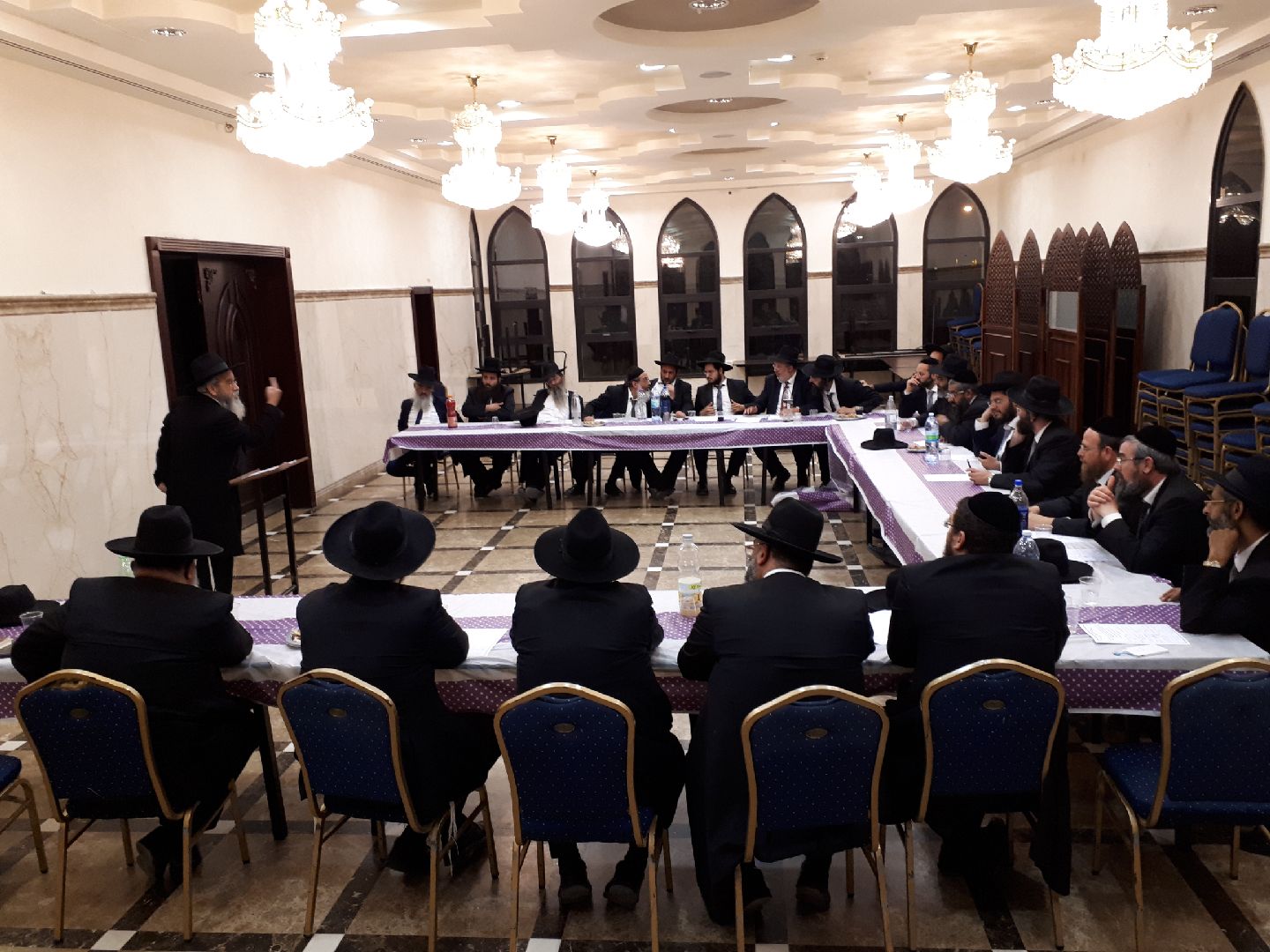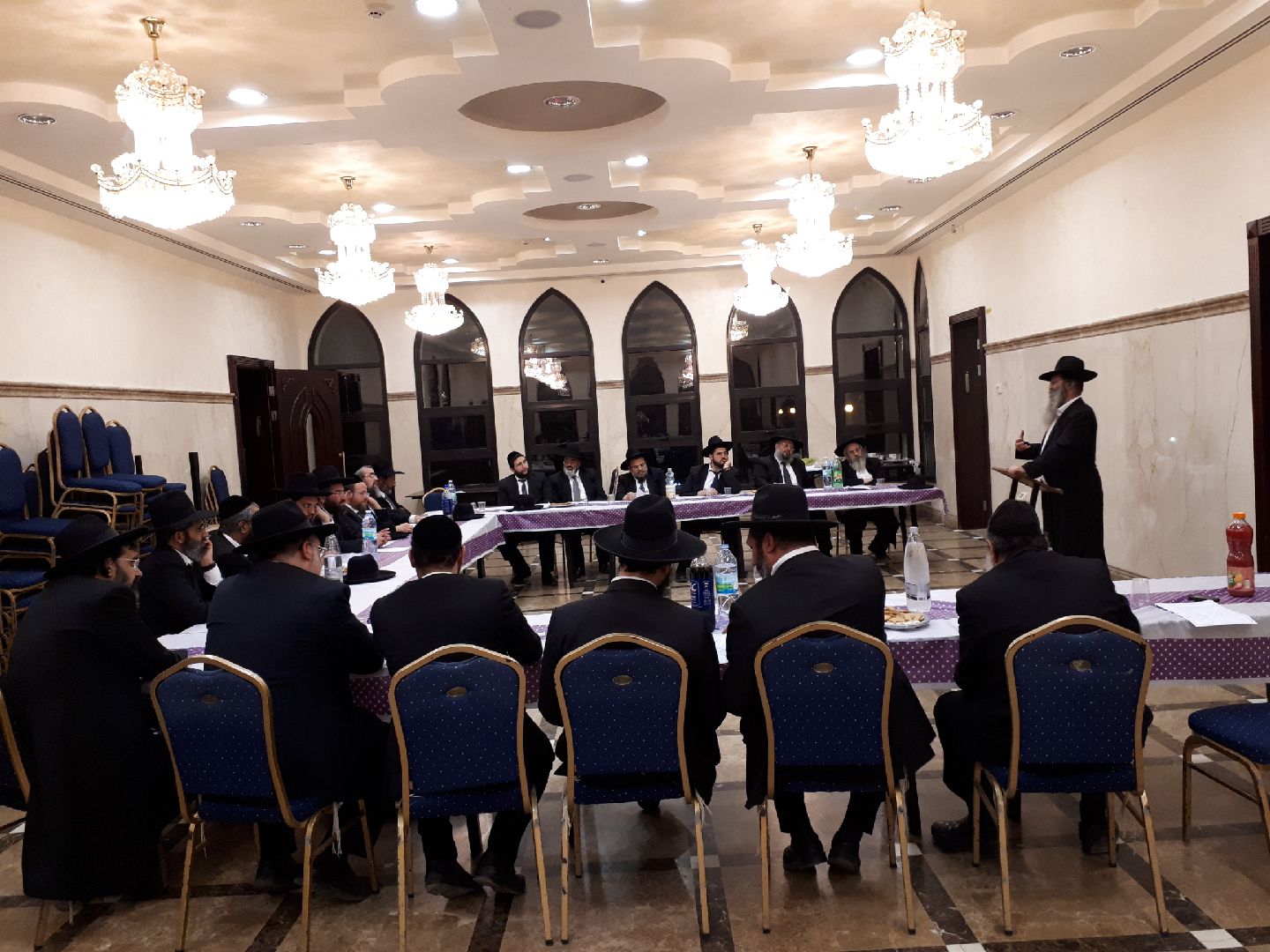"They Don’t Know Anyone Who Studies in a Yeshiva, Yet They Choose to Learn There"
What happens to children who graduate from "kiruv" schools? Do they continue to yeshivas or high schools? Rabbi Yaakov Moyal leads the charge with his team, guiding thousands of boys to sacred yeshivas. An idealistic conversation ensues.
 (In the circle: Rabbi Yaakov Moyal)
(In the circle: Rabbi Yaakov Moyal)In the past week, Rabbi Yaakov Moyal experienced moments of immense satisfaction. It was when he received invitations to the weddings of two of his graduates—one living in Haifa, the other in Beit Shean. Both come from homes with no connection to Torah and mitzvot, yet they studied in yeshiva settings and are now, as mentioned, about to build their own homes.
"This is not the first time I have been invited to such weddings," says Rabbi Moyal, his voice filled with great joy. "Every time I am moved anew because seeing these young men who came to us with no background in Judaism, and watching the heights they reach—it's the most moving experience possible".
Providing Guidance and Direction
The boys Rabbi Moyal encounters are, in essence, children studying in schools called 'kiruv.' They come from non-religious homes but typically undergo a significant process of drawing closer to religion during their school years. "Our goal is to maintain this closeness," explains Rabbi Moyal. "We know that if they continue into religious frameworks, their entire future will reflect that. If, heaven forbid, we do not succeed, we lose the eight years invested in them. Of course, there is a difference between students, and each one is suited to a different yeshiva based on their spiritual and academic level. There is also a difference in the nature of the boys—some are more energetic, and others are quieter, some need a large and powerful framework, and others a smaller, warmer framework with personal and close guidance.
"Therefore, we invest all efforts to provide the correct guidance so that everyone can fit into a place that suits them exactly. Sometimes there are children who are not suited for standard sacred yeshivas, and then we help them choose a religious high school with as high a spiritual level as possible, so they do not lose the spiritual achievements they have acquired over the years".
 Organizational activity
Organizational activityCan an eighth grader really know what he wants?
"Perhaps it's surprising, but most children at this point in time are very mature. We introduce them at the beginning of the year and try to show them the enormous benefits and the goodness and blessing that exist in religious frameworks and sacred yeshivas. The boys certainly understand the challenges of integrating into such frameworks, the mental distance and the different lifestyle, but with proper explanation and true knowledge of the Torah world—the path to the goal becomes easy and full of spiritual motivation".
Getting to Know and Explain
Rabbi Moyal has been involved in education for 22 years. "I always felt drawn to working specifically with the next generation, the youth," he explains. "Even as a young man, I managed various initiatives such as Tehillim groups, interim yeshivas for boys, and the like. Over the years, I focused mainly on kiruv, primarily because I felt the immense satisfaction and the needs of the time. As time passed, I started focusing more on guiding teenagers graduating from 'kiruv' elementary schools and standing at a crossroads before moving to yeshivas or high schools. I tried every effort to make them choose the good—'choose life,' study in a sacred yeshiva, and avoid other places that pose great spiritual danger.
"It was not easy at all; much explanation was required, dismantling preconceived notions and countering the perceptions created in the street and media regarding the Torah world".
Why is it so complicated? Aren’t these boys coming from religious schools, already having the background?
"That's true, yet even such boys need to adapt to the yeshiva world, which is entirely different from what they knew throughout their school years. For example - the school day that used to end at three is extended in the yeshiva to a long day which ends around nine in the evening, often within a dormitory framework. The dress code is also different; in most schools, children dress freely without a uniform dress code, unlike in the yeshiva where everyone wears 'eight garments.' Incidentally, during exams I always carry a 'clothing warehouse' in my car—suits and hats in various sizes for boys whose wardrobes do not include these necessary items for the yeshiva interview and exams. These boys often do not know anyone in a yeshiva setting, and everything is new and unfamiliar to them".
Rabbi Moyal notes that over the years he also worked alongside establishing dedicated yeshivas for kiruv. "Today, there are several yeshivas explicitly designed for kiruv children. The integration into the yeshiva world is done gradually there. By the end of the period, it is challenging, if not impossible, to see a fine line between them and mainstream Torah students."
And he has a very moving story about it: "We accompanied a child from a moshav in the south who studied in a kiruv elementary school, yet when it was time to register for yeshivas, it became clear to us he would struggle to study in a standard yeshiva, especially since he was very connected to his father's farm and the animals there. In a joint decision with the educators and consulting with his parents, it was decided to send him to a yeshiva we established. There, they indeed managed to accommodate his needs, allowing him to return home often, and at the same time connecting him to the yeshiva atmosphere. Today," says Rabbi Moyal, "this child is already a scholar and a father of children, meditating on Torah all day, and there are dozens more like him."
 Staff in action
Staff in actionWhat do you explain to the parents? Why is yeshiva a good option for their child?
"Actually, the explanation is the simple part for us. Today, parents see with their own eyes the alternative, which is high school, and they realize that while there might be diplomas, there isn't much that helps the child build his personality. We talk to them about this, and also conduct many home visits and conversations where we explain that one can enjoy the immense content available only in yeshivas, without the boy's future employment prospects being compromised. There are numerous programs within colleges and universities tailored for yeshiva graduates, easily finding a path towards a degree in the future. It's a shame to miss out on the spiritual and human achievements and stable foundation for life during the confusing teenage years.
"We also talk a lot about the challenges adolescents face, and the parents understand by themselves that in yeshiva, the child will be more protected; he will receive tools that will truly help him in life, as well as intellectual sharpness from studying the Talmud in depth. Incidentally, this has proven itself, as many high-tech managers openly state that yeshiva graduates are not less successful and sometimes even more successful than others.
"In the end, we see that even parents who initially worry are very pleased. They see the values their child brings home, feel his respect for them, and are sometimes even proud when he takes out a book at the Shabbat table, tells a Torah portion, and enriches them with halachot. In most cases, it only brings them joy".
With Close Guidance
"Though we often deal with worried parents, from our perspective, this is not our greatest challenge," Rabbi Moyal surprises. What primarily requires our utmost effort is ensuring that the boys who enter yeshivas continue learning there, that they integrate well, that they are happy, find their place, and don't leave with a bitter taste." To this end, as he points out, they offer a 'continuation treatment' section in the project.
What is this section?
"We employ coordinators nationwide who visit yeshivas every evening and act like big brothers to our students. If a problem arises, they are the first to hear about it and strive to solve it. Sometimes they really fight to ensure a boy isn't expelled from yeshiva, and in cases where it turns out a boy truly doesn't fit, they arrange for him to be transferred that very day to an alternative yeshiva, inform the mentor responsible for that yeshiva to which he is moving, and thus transfer another boy to his responsibility. These dedicated workers put their heart and soul into the success of the project, and it is clearly evident on the ground.
"We had a very special student who lived in Ramla," he recalls, "At the start of the year, it was clear to him he was going to high school, but we didn't give up. We worked hard with him, took him to visit yeshivas and talk with boys studying there, even brought him to the home of the great Rabbi Chaim Kanievsky Shlit'a who blessed him that if he studied in yeshiva he would experience great satisfaction and divine assistance throughout his life. In the end, he was convinced and expressed willingness to continue in yeshiva, but then the opposition from his mother and older siblings came. They argued 'under no circumstances would they allow the child to become a parasite'. Eventually, we arranged a home visit to the family, arrived in the evening, and left after midnight. There was a lengthy and heated discussion. The conversation ended with the siblings and parents agreeing, and the boy went to a sacred yeshiva, but it did not end there. Over the years, there were ups and downs, occasional regrets, and we were there every step of the way to support and maintain it. Ultimately, the boy graduated yeshiva with honors, and went on to one of the top large yeshivas in the country".
 Organization staff
Organization staff
3000 Graduates a Year
Rabbi Moyal's activities took a step up about ten years ago, when he was called by the management of the Transportation Fund founded by Rabbi Shteinman ZT"L and was asked to join this important initiative—establishing a yeshiva guidance and follow-up system that will operate in all independent educational schools, in all peripherals nationwide, within the framework of the 'Transportation Fund'.
"I understood the role was immense, and yet I took it upon myself," says Rabbi Moyal. "Thank Hashem, since the project began, we are seeing an incredible increase in the number of children attending yeshivas, as well as in those who continue afterward to large yeshivas and build Torah homes. If in the past 30% of school children in a certain school would go to yeshiva, and of them, 50% wouldn't survive, today, about 95% can go from the same class, and the vast majority integrate wonderfully into the yeshiva world, adorning the eastern wall of the great yeshiva halls. Even when there are boys who struggle, we don’t rest for a moment until we find the right place for them".
About five years ago, the activity expanded even further when Rabbi Moyal was asked to establish an identical project in the 'Bnei Yosef' network by the network's management, so each year there are about 3000 boys finishing eighth grade, accompanied by the project, entering the yeshiva world. "The yeshivas we enroll the boys in are varied—from kiruv yeshivas to those considered in the top tier of the ultra-Orthodox yeshiva world," clarifies Rabbi Moyal. "Our project spreads from Kiryat Shmona to Eilat, and altogether we work in approximately 195 small yeshivas and 165 schools".
Aren't small yeshivas hesitant to accept boys due to their background?
"Initially there was a fear, but not anymore. The yeshiva heads know us well, and thank Hashem, we've managed to build very strong trust. At the yeshivas, they know we don’t just place the boys and disappear, but instead continue to stand behind them the whole way, and they can always reach out to us and talk, from their perspective, we are the insurance company for these boys".
Do you ever place a boy in a yeshiva and end up disappointed when he can't continue?
"Yes, unfortunately, it happens, but we don't give up. In the early stages, we try to solve the problem, together with the yeshiva staff. Sometimes it’s enough just to talk with the boy or lighten some tasks for him, and he's already on the right track. If we see there's no way the boy can settle in the small yeshiva he's in, we transfer him to another setting that's more suitable.
"It's worth noting that during the COVID period, we conducted over 450 home visits, all aimed at bringing boys back to frameworks because some really struggled to return and cope. Thank Hashem, there was great success; the vast majority of boys eventually returned, and the dropout rate was truly minimal".
And what about the future? Do you have special plans?
"Yes, we have a big aspiration," reveals Rabbi Moyal. "We intend to continue the project in large yeshivas as well because the boys need guidance there too. I really hope that soon this can come to fruition".
To contact the Guidance Center for Sacred Yeshivas:02-5-664-664

